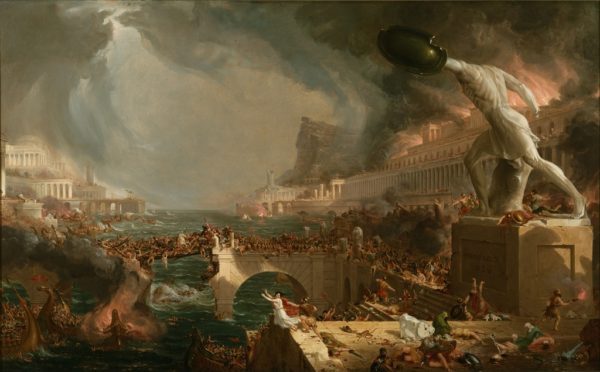Collective Insanity
For those of you who sat in history class wondering what it was like to witness the fall of Rome or Angkor Wat, we now have an answer as to how they fell: everyone went crazy.
Often the simplest explanations are the best. We know that humans pick up ideas and behaviors from others, and that we imitate those who are successful, so it is no stretch to see that if people succeed while doing crazy things, others will imitate them. They will then get self-righteous about their insanity, and call others ignorant or crazy for not following them down the path to insanity.
This collective insanity is a type of prolonged trend, but its biological counterpart is the stampede. A stampede is both a response to a threat, and a fear-of-missing-out (FOMO) psychology that creates a tragedy of the commons: open space is needed to escape the threat, but each animal is afraid that another will get there first, so they all attempt to get there before the others.
Stampedes contain a certain irony in that in many cases, if they were simply pointed toward the predator, the threat would quickly be over. Instead, they show the effects of mass panic. Each individual is afraid less of the predators than of being trampled, and that others will escape and leave them behind to be eaten. And so, a race to consume space occurs, and this overwhelms every other impulse.
In the case of human stampedes, people respond to opportunity that is too good to be true, as is the case in most human scams. The civilization scam involves the fact that those who act emotionally and appeal to the herd will get ahead, like Justin Trudeau or Barack Obama, and so everyone imitates that model in the hope that they can rise above their level of competence.
Our current stampede began shortly after our civilization became materially successful owing to the rise of cities. Then came the middle class, who chafed at rules designed to preserve culture and civilization since these made commerce inefficient. Instead of asking whether commerce alone could be the center of civilization, the middle class organized to overthrow these rules.
First they made it trendy for “intellectuals” to worship the human form instead of the abstract ideals of the past through a cultural movement, paralleling 1968, called The Renaissance.™ Next they legitimized the idea of equality and the goal of society being to facilitate the dreams of the individual human with The Enlightenment,™ and followed that up with Romanticism in which the idea of the eternal won out to be fleeting sensations of significance found in human emotion.
After that, democracy came and — parallel to Athens in the days of its downfall — quickly began to dismantle culture, religion, heritage, caste, hierarchy, sex roles, family, and even sanity. It became a prole-driven world, where those with the simplest possible opinions and thus the most popular ones won out over any kind of history, logic, common sense or realistic practicality.
Now, most people resemble demons. They greedily endorse the crazy ideas of egalitarianism, and take delight in tearing down anything which is above the level of the average person. Every speech and writing must be made simplistic, music has to be a beat and a random melody line, politics has become a game of giving free things, and in everyday life, “me first” has replaced any kind of civility.
The behavior of the average person in the West is shocking and saddening, and they like that. In a crowd of equals, no one is important until they stand out by doing stunts or otherwise drawing attention to themselves, and so people like to be outrageous if they can. More importantly, they are cruel. They treat their children like possessions, and live for the temporary, because the less they care about and invest in anything outside of themselves, the more personal power they feel.
It seems as if the stampede to overthrow the kings has turned every person into a tyrant.
A few hold out. There is a remnant of people who are Western European in blood, chaste by nature, reflective of mind and who act toward what is good and beautiful instead of what is short term personal gain. But they are few, and the crowd gleefully shouts them down and dismantles whatever they do, once it finds it.
Even more, the herd behavior destroys things that the crowd loves. Any new patch of land becomes a neighborhood with good schools as the pioneers move in, but then everyone wants their share, and they elbow their way in or demand it from their politicians. But they have not changed their own internal traits, and thus their behaviors, so they continue to behave as they have, and quickly make it into the same ruin that everything else is. When the crowd arrives, whatever was new becomes old and mediocre, so that everyone can participate.
This is real end times stuff. Humanity is like a person in a leaky boat who spends most of his time bailing out the water coming in. That represents the constant infighting, corruption, unnecessary drama and incompetence of our society. He looks out in the water and just fifty yards away is a brand new boat. But there is risk in crossing the open water, so he stays and bails.
Our only hope is to kick a hole in the boat big enough that it sinks, so that we can then realize we have no other choice but to swim to the other boat if we want to live. That other boat will not be opposite of our present time, but represent the saner path we were on before we went down this path, and we will pick up where we left off and then improve that, instead of trying to patch the irreparable present.
Tags: collapse, delusion, egalitarianism, insanity, romanticism, the enlightenment, the renaissance










